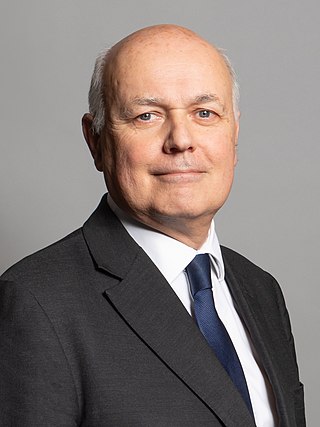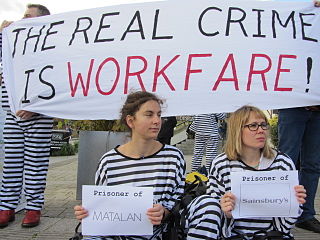Related Research Articles

Sir George Iain Duncan Smith, often referred to by his initials IDS, is a British politician who served as Leader of the Conservative Party and Leader of the Opposition from 2001 to 2003. He was Secretary of State for Work and Pensions from 2010 to 2016. He has been Member of Parliament (MP) for Chingford and Woodford Green, formerly Chingford, since 1992.

The welfare state of the United Kingdom began to evolve in the 1900s and early 1910s, and comprises expenditures by the government of the United Kingdom of Great Britain and Northern Ireland intended to improve health, education, employment and social security. The British system has been classified as a liberal welfare state system.
Guaranteed minimum income (GMI), also called minimum income, is a social-welfare system that guarantees all citizens or families an income sufficient to live on, provided that certain eligibility conditions are met, typically: citizenship; a means test; and either availability to participate in the labor market, or willingness to perform community services.

The Department for Work and Pensions (DWP) is a department of His Majesty's Government responsible for welfare, pensions and child maintenance policy. As the UK's biggest public service department it administers the State Pension and a range of working age, disability and ill health benefits to around 20 million claimants and customers. It is the second largest governmental department in terms of employees, and the largest in terms of expenditure (£187bn).
Jobseeker's Allowance (JSA) is an unemployment benefit paid by the Government of the United Kingdom to people who are unemployed and actively seeking work. It is part of the social security benefits system and is intended to cover living expenses while the claimant is out of work.

Atos is a French multinational information technology (IT) service and consulting company headquartered in Bezons, France and offices worldwide. It specialises in hi-tech transactional services, unified communications, cloud, big data and cybersecurity services. Atos operates worldwide under the brands Atos, Atos|Syntel, Atos Consulting, Atos Healthcare, Atos Worldgrid, Groupe Bull, Canopy, Maven Wave, and Unify.

Mark James Harper is a British politician who has served as Secretary of State for Transport since 2022. A member of the Conservative Party, he has been Member of Parliament (MP) for Forest of Dean since 2005.
Housing Benefit is a means-tested social security benefit in the United Kingdom that is intended to help meet housing costs for rented accommodation. It is the second biggest item in the Department for Work and Pensions' budget after the state pension, totalling £23.8 billion in 2013–14.
The National Employment Savings Trust (Nest) is a defined contribution workplace pension scheme in the United Kingdom. It was set up to facilitate automatic enrolment as part of the government's workplace pension reforms under the Pensions Act 2008. Due to its public service obligation, any UK employer can use Nest to meet its new workplace duties as set out in the Pensions Act 2008.

Poverty in the United Kingdom refers to the portion of the population of the United Kingdom that are considered to be in poverty under some measures of poverty.
Employment and Support Allowance (ESA) is a United Kingdom welfare payment for adults younger than the State Pension age who are having difficulty finding work because of their long-term medical condition or a disability. It is a basic income-replacement benefit paid in lieu of wages. It is currently being phased out and replaced with Universal Credit for claimants on low incomes, although the contribution-based element remains available.

David Anthony Freud, Baron Freud, is a British politician, life peer, and former investment banker who served as Minister for Welfare Reform from 2010 to 2016. Before he joined the Conservative Party, he was vice-chairman of investment banking at UBS and a government adviser on welfare reform.
Universal Credit is a United Kingdom social security payment. It is means-tested and is replacing and combining six benefits for working-age households with a low income: income-related Employment and Support Allowance, income-based Jobseeker's Allowance, and Income Support; Child Tax Credit and Working Tax Credit; and Housing Benefit. An award of UC is made up of different elements, which become payable to the claimant if relevant criteria apply: a standard allowance for singles or couples, child elements and disabled child elements for children in the household, housing cost element, childcare costs element, as well as elements for being a carer or having an illness or disability and therefore having limited capability to work.
Mandatory Work Activity (MWA) was a workfare programme in the United Kingdom whereby individuals had to work for their benefits or risk being 'sanctioned' and losing them. MWA started in May 2011, but in November 2015 the DWP confirmed it was "not renewing" it. An academic analysis by the Department of Work and Pensions cast doubt on the effectiveness of MWA, and despite finding "little evidence" that workfare improved claimants gaining paid employment, the DWP ignored the findings of the study, and in June 2012, the scheme received a £5m expansion. A similar but little-known scheme 'Jobseeker Mandatory Activity' (JMA) was piloted by New Labour in 2006, but did not last beyond 2008. JMA targeted those claimants 25 and over, who had been unemployed for 6 months or more and made claimants liable to 'sanction' for non-compliance.

Workfare in the United Kingdom is a system of welfare regulations put into effect by UK governments at various times. Individuals subject to workfare must undertake work in return for their welfare benefit payments or risk losing them. Workfare policies are politically controversial. Supporters claim that such policies help people move off welfare and into employment whereas critics argue that they are analogous to slavery or indentured servitude and counterproductive in decreasing unemployment.
The Work Programme (WP) was a UK government welfare-to-work programme introduced in Great Britain in June 2011. It was the flagship welfare-to-work scheme of the 2010–2015 UK coalition government. Under the Work Programme the task of getting the long-term unemployed into work was outsourced to a range of public sector, private sector and third sector organisations. The scheme replaced a range of schemes which existed under previous New Labour governments including Employment Zones, New Deal, Flexible New Deal and the now abolished Future Jobs Fund scheme which aimed to tackle youth unemployment. Despite being the flagship welfare-to-work scheme of the Conservative-led coalition government, and then the incumbent Conservative government from May 2015, the DWP announced, in November 2015, that it was replacing the Work Programme and Work Choice with a new Work and Health Programme for the longer-term unemployed and those with health conditions. The DWP also announced that it would not be renewing Mandatory Work Activity and Help to Work which included Community Work Placements.
Personal Independence Payment is a welfare benefit in the United Kingdom that is intended to help working age adults with the extra costs of living with a health condition or a disability.

The Welfare Reform Act 2012 is an Act of Parliament in the United Kingdom which makes changes to the rules concerning a number of benefits offered within the British social security system. It was enacted by the Parliament of the United Kingdom on 8 March 2012.
Disability is an issue that directly affects a significant proportion of the population of the United Kingdom. Section6(1) of the Equality Act 2010 defines disability as:
"A person has a disability for the purposes of the Act if he or she has a physical or mental impairment and the impairment has a substantial and long-term adverse effect on his or her ability to carry out normal day-to-day activities."

Iain Duncan Smith served as Secretary of State for Work and Pensions from 2010 to 2016. A member and previous leader of the Conservative Party, Duncan Smith was appointed to the cabinet by Prime Minister David Cameron following the 2010 general election and the formation of the coalition government between the Conservatives and the Liberal Democrats. He was reappointed after the Conservatives won a majority in the 2015 general election but resigned in March 2016 in opposition to disability benefit cuts.
References
- ↑ "Department for Work and Pensions' settlement at the Spending Review". DWP. 25 December 2015. Retrieved 25 December 2015.
- ↑ Help to Work Statistics / April 2014 to June 2017
- ↑ "BBC News - Help to Work: New unemployment rules in force". BBC.co.uk. 28 April 2014. Retrieved 13 June 2014.
- ↑ Jonathan Portes (29 December 2013). "The "Help to Work" pilots: success, failure or somewhere in between?". National Institute of Economic and Social Research. Retrieved 17 January 2016.
- ↑ Richard Godwin (2 April 2014). "Richard Godwin: Help to Work is slavery by another name - Comment - London Evening Standard". Standard.co.uk. Retrieved 13 June 2014.